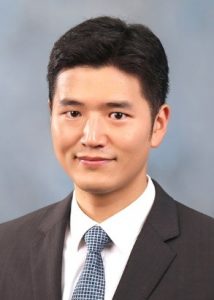Park to Investigate the Impact of Lightning on RADAR Absorbing Composites
December 15, 2020

As a leading expert on the study of lightning damage on dialectic materials, Dr. Park was asked by Gyeongsang National University (GNU) in South Korea to study various types of lighting-tolerant Glass Fiber Reinforced Plastic (GFRP) composite laminate panels with RADAR absorbing properties. These tests will be conducted at the Paul B. Jacob High Voltage Lab (HVL), for which Dr. Park is the Director of Research.
The compact and modular design of the lightning current impulse generator developed by Dr. Park and his team at the HVL enables eight parallel connection of 47 μF capacitors, each of which has a voltage rating of 44 kV. The generator can deliver impulse current magnitudes greater than 200 kA with the maximum lightning impulse energy of 400 kJ. The newly added lightning impulse testing capability enables the HVL team led by Dr. Park to collaborate with scientist and engineers from various disciplines.
“Owing to the light weight and high mechanical strength, various metal components have been replaced by glass/carbon fiber reinforced polymer (G/CFRP) composites in the aerospace industry. Despite the superb mechanical properties, using G/CFRP composites introduces major challenges to applications that are exposed to lighting because of the poor electrical conductivity compared to their metal predecessors. The low electrical conductivity of resins used in these composites causes enormous Joule heating upon lightning strike, which leads to significant mechanical and thermal damage to the materials. With the goal of addressing the challenge, GNU is collaborating with us accurately evaluate the lightning strike tolerance of various RADAR absorbing materials. Our lightning research capabilities are expected to bring in more research collaboration opportunities to the state of Mississippi,” stated Dr. Park, Assistant Professor in ECE.
“Dr. Park’s work is at the cutting edge of developing new dielectric materials that can solve myriad of challenges in high-field and high-power-density applications. His leadership on the research direction that the HVL will undertake will shape R&D landscape in high voltage and high power for years to come,” said Dr. Khan, the ECE Department Head.
For more information about Dr. Park, please visit his webpage.
The Department of Electrical and Computer Engineering at Mississippi State University consists of 23 faculty members (including 7 endowed professors), 3 clinical faculty, 10 professional and support staff, and over 700 undergraduate and graduate students with approximately 88 being at the Ph.D. level. With research expenditure of the department in excess of $10M, the department houses the largest High Voltage Laboratory among North American Universities. For more detailed information on the department please visit our website www.ece.msstate.edu.
